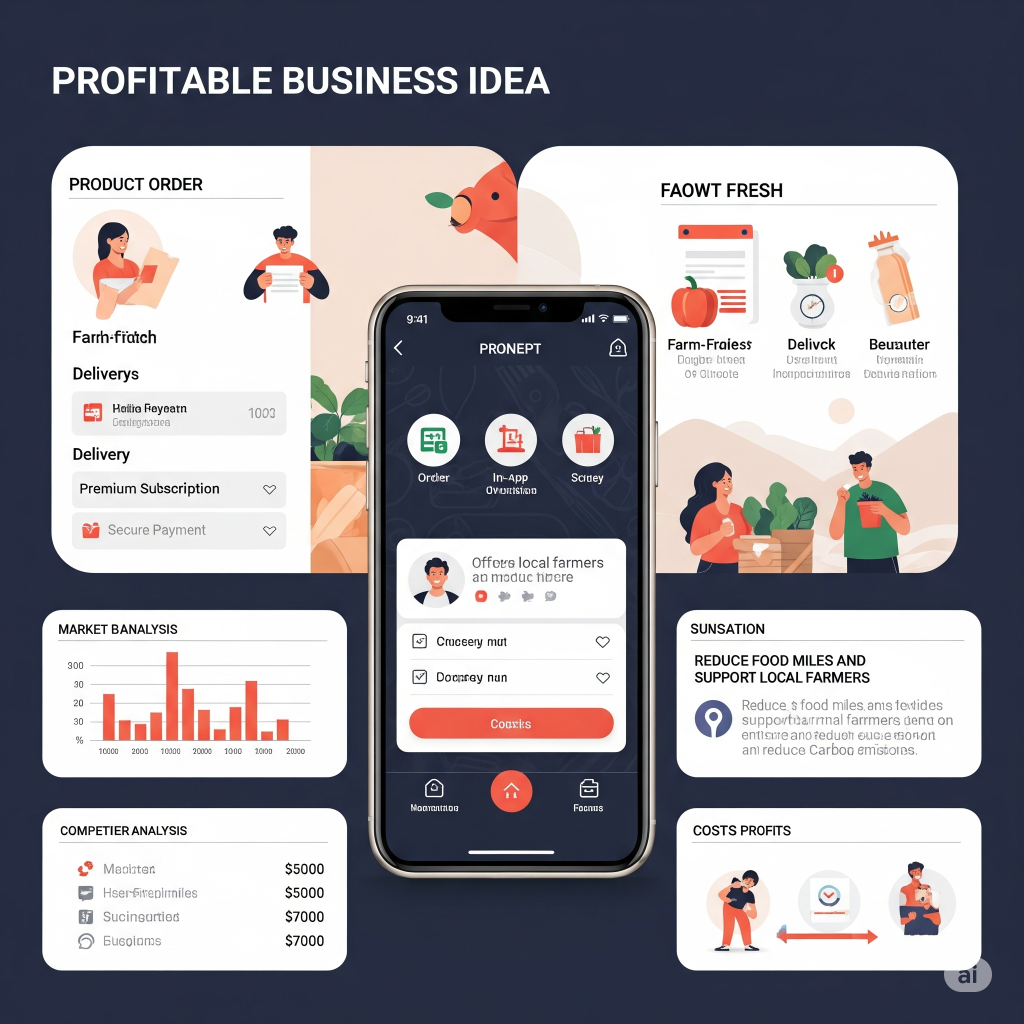

The business world is changing faster than ever. To succeed, you need a solid plan and the right tools. This guide, inspired by insights from X, will walk you through 10 key steps to launch and grow your business.
Let’s dive in!
1. Find a Profitable Idea
Every successful business starts with a great idea. But how do you find one? Look at current market trends and what people need. Think about your skills and what you’re passionate about. A profitable idea solves a problem and meets a demand.
Here’s how to get started:
- Brainstorm: Write down any business ideas that come to mind. Don’t worry about judging them yet. Consider local needs in Onitsha or Nigeria, for example, are there specific problems people face that a new business could solve?
- Research: See if there’s a market for your ideas. Are people already buying similar products or services in your target area (locally, nationally, or internationally)? What are their experiences?
- Validate: Test your idea with potential customers. Talk to people in Onitsha or your target market. Ask for their honest feedback. Are they willing to pay for your solution?
Remember, the best ideas often come from seeing a problem and finding a unique way to solve it.
2. Identify Your Ideal Customer
Knowing who your ideal customer is crucial for every aspect of your business, from product development to marketing. You can’t sell effectively to everyone. By defining your ideal customer, you can tailor your offerings and communication to resonate with the people most likely to buy from you.
Your ideal customer persona is a semi-fictional representation of your best customer. It’s based on research and some assumptions about your target audience. Here’s a detailed breakdown of how to define your ideal customer persona for a [insert your business type here, or we can use a general example]:
2.1 Demographics: Painting a Picture
Demographics provide the basic statistical characteristics of your ideal customer. Consider the following:
- Age: What is the typical age range of your ideal customer? Are they young adults, middle-aged professionals, or retirees? Understanding their age helps you tailor your language and choose appropriate marketing channels. For example, if you’re targeting young adults in Onitsha, social media platforms like Instagram and TikTok might be more effective than traditional print advertising.
- Gender: Is your product or service primarily for men, women, or both? While many products appeal to everyone, some have a stronger appeal to a specific gender.
- Location: Where does your ideal customer live? Are they in a specific city like Onitsha, a particular region of Nigeria, or are they global? Local businesses need to understand the specific needs and preferences of their local market. For instance, a clothing boutique in Onitsha might stock different styles and sizes than one in Lagos due to regional preferences and climate.
- Income Level: What is the average income of your ideal customer? This will influence their purchasing power and the price point you can set for your products or services. Understanding the economic realities of your target market in Nigeria is crucial.
- Education Level: What is the typical education level of your ideal customer? This can influence how you communicate with them and the complexity of your product descriptions.
- Occupation: What kind of jobs do your ideal customers typically have? Understanding their profession can provide insights into their needs and challenges.
- Marital Status and Family Size: Are they single, married, or do they have children? Family life can significantly impact purchasing decisions.
2.2 Psychographics: Understanding Their Minds
Psychographics delve into the psychological aspects of your ideal customer, such as their:
- Interests: What are their hobbies and passions? What do they enjoy doing in their free time? Understanding their interests helps you connect with them on a personal level. For example, if your business sells sporting goods in Onitsha, knowing popular local sports will help you tailor your inventory and marketing.
- Values: What is important to them? Do they value sustainability, convenience, affordability, quality, or status? Aligning your brand with their values can build strong customer loyalty.
- Attitudes: What are their general opinions and beliefs about the world and specific topics relevant to your business?
- Lifestyle: How do they live their lives? Are they busy professionals, stay-at-home parents, or students? Understanding their lifestyle helps you position your product or service as a solution that fits into their daily routines.
- Personality: Are they adventurous, cautious, outgoing, or introverted? Tailoring your brand voice and marketing messages to resonate with their personality can increase engagement.
2.3 Pain Points: Identifying Their Problems
Understanding your ideal customer’s pain points is crucial because your business should offer solutions to these problems. Consider:
- What challenges do they face in their daily lives or related to your industry? For example, if you’re starting a delivery service in Onitsha, a major pain point for customers might be traffic congestion or unreliable existing delivery options.
- What frustrations do they experience when trying to achieve their goals?
- What unmet needs do they have?
- What problems are they actively searching for solutions to?
By clearly identifying these pain points, you can position your product or service as the answer they’ve been looking for. Your marketing messages should directly address these pain points and highlight how your offering provides relief.
2.4 Acquisition Strategies: Reaching Your Ideal Customer
Once you know who your ideal customer is and what their pain points are, you need to figure out how to reach them. Consider the following acquisition strategies:
- Where do they spend their time online? Are they active on social media platforms like Facebook, Instagram, Twitter, or LinkedIn? Do they read specific blogs or online publications? Understanding their online behavior helps you choose the right digital marketing channels. In Nigeria, for example, WhatsApp is a widely used platform for communication and even business.
- What websites do they visit? Are there industry-specific websites or forums where they gather information?
- What kind of content do they consume? Do they prefer reading blog posts, watching videos, listening to podcasts, or attending webinars?
- Are there any offline channels that are effective for reaching them? Depending on your business and location (like Onitsha), this could include local newspapers, radio stations, community events, or flyers.
- Who are the influencers or thought leaders they follow? Collaborating with relevant influencers can be a powerful way to reach your target audience.
By answering these questions, you can develop a targeted marketing strategy that focuses on the channels where your ideal customers are most likely to be found.
2.5 Example Ideal Customer Persona: “Tech-Savvy Young Professional”
[Let’s create a brief example based in Nigeria to make it more concrete, assuming a hypothetical online education platform focusing on digital skills]:
Name: Chinedu Okafor
Age: 28
Location: Onitsha, Anambra State, Nigeria
Occupation: Junior Marketing Executive at a local SME
Education: Bachelor’s Degree in Business Administration
Income: NGN 80,000 – NGN 120,000 per month
Interests: Technology, digital marketing, career development, online learning, social media
Values: Professional growth, skill acquisition, convenience, affordability
Pain Points: Limited access to high-quality, affordable digital marketing training in Onitsha; feeling behind on the latest industry trends; struggling to implement effective marketing strategies; seeking career advancement opportunities.
Online Behavior: Active on LinkedIn, Instagram, and WhatsApp; follows tech and marketing influencers; reads tech blogs and online marketing publications; uses YouTube for tutorials.
Acquisition Strategies: Targeted ads on LinkedIn and Instagram; content marketing (blog posts and articles on digital marketing); partnerships with local business hubs; WhatsApp marketing; free introductory webinars.
Creating personas like Chinedu helps you humanize your target audience and make more informed decisions about your business.
By thoroughly defining your ideal customer, you lay a strong foundation for all your subsequent business decisions. It ensures that your product or service meets a real need, your marketing efforts are targeted and effective, and you build a loyal customer base.
